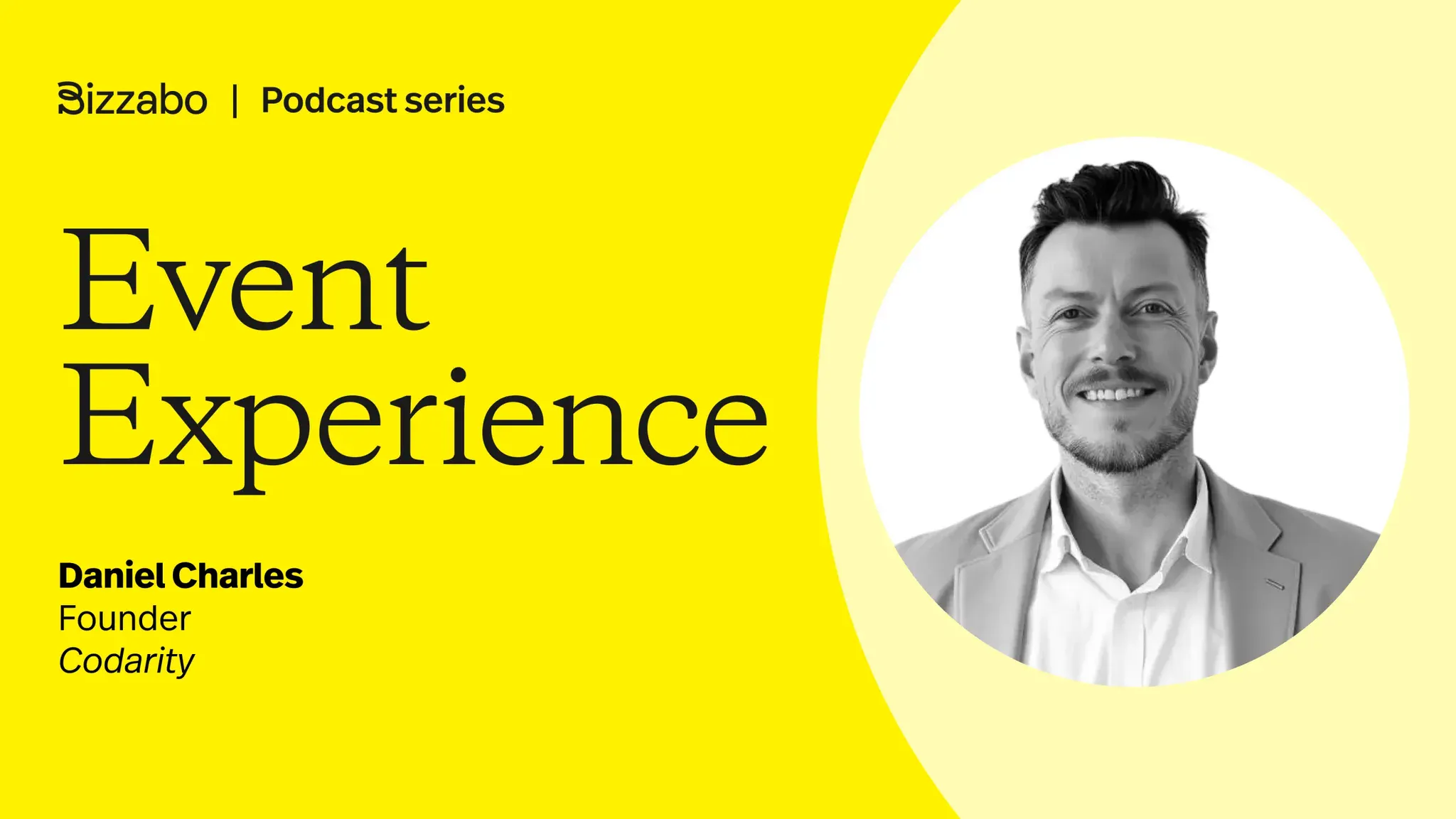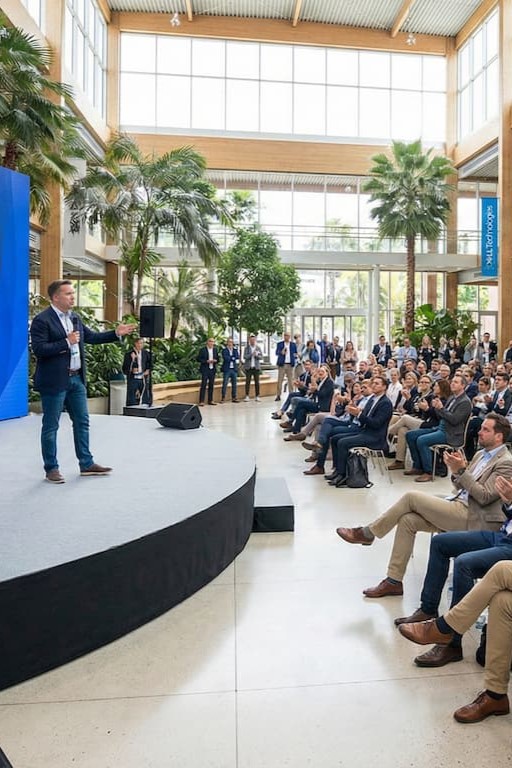Dan Charles
17/11/2025
Table of Contents

The event marketing industry has a dirty little secret nobody wants to admit: we’re drowning in technology but starving for genuine engagement.
Every week, another shiny martech platform promises to revolutionize how event businesses attract clients. AI-powered chatbots, predictive analytics, marketing automation suites that cost more than a mid-tier event venue’s monthly revenue. Algorithm hacks, growth hacks, the latest Meta update that changes everything. The pitch is always the same: adopt this approach or get left behind.
Here’s what I’ve learned after helping event agencies generate millions in predictable revenue: most of these tools and tactics are solving problems you don’t actually have.
Key Takeaways
- The martech obsession distracts event businesses from direct response fundamentals that have worked for decades and will work for decades more.
- Disconnected channels following individual trends create confusion rather than conversion, especially problematic when event buyers need 15-20 touchpoints before engaging.
- Human psychology doesn’t update weekly like ad platforms do—story-driven narratives built on clear ICP understanding can run profitably for 18+ months.
- Marketing to Joseph the CEO with daily operational realities beats marketing to abstract “business outcomes” every single time.
- The hidden costs of constant creative reinvention aren’t just financial—demotivation and wheel-spinning slow event businesses down more than failed campaigns.
The Real Cost of Algorithm Chasing
Recently we completed an EEPS Strategy Assessment with a client who had all the martech boxes ticked. Multiple marketing channels, sophisticated automations, premium software subscriptions. On paper, they were doing everything the industry tells you to do.
The problem? None of it was talking to each other.
We went through their entire customer journey as if we were their ideal client. Channel to channel, source to source, message to message. What we found was complete chaos. Every channel had its own strategy based on whatever trend or hot topic was current at the time.
No cohesive positioning. No unified narrative.
The LinkedIn ads were calling out one avatar. The Google Ads were solving a completely different problem. The website was telling yet another story. Some channels were working, sure, but most weren’t.
And here’s the kicker: when prospects encountered these disconnected messages across their research journey, they got confused rather than convinced.
This matters more in the event industry than almost anywhere else. Corporate event buyers need 15-20 touchpoints before they’ll have a conversation with you. That’s the reality of our sales cycles. When you’re spreading yourself across multiple channels with diluted, inconsistent messaging, you’re not creating those valuable touchpoints.
You’re creating noise.
Understanding the complete event marketing timeline shows exactly why cohesive messaging matters so much in our industry.
More channels plus more technology equaled less clarity and worse results. They were doing more work, spending more money, and actually making it harder for qualified prospects to understand what they did and why it mattered.
What Actually Never Changes
Ad platforms update constantly. I’m talking weekly dashboard changes, new policies, algorithm adjustments. Every martech vendor is using AI to “ruthlessly optimize” their systems. The landscape shifts beneath your feet all the time.
You know what doesn’t change? Human psychology.
Give me a clearly defined ICP, a clearly defined challenge that ICP faces, and a clearly defined solution you provide. Place it in a story-driven narrative where you’re not relying on heavy tactical wording or commoditized terms. Focus on an emotional story with a beneficial outcome.
Watch that scale to the moon.
I’ve seen ads built on these fundamentals run for 18 months without burning out. Not because they’re leveraging some algorithm hack or gaming the system. Because they’re speaking to unchanging human needs and desires in a compelling way. Building competitive moats through positioning rather than chasing trends is what creates that long-term performance.
Compare that to what I see from event agencies trying to keep up with every platform update. They’re creating 15-20 new ad creatives every week. Pumping out content. Chasing the latest trend. But they’re still stuck on the same narrative, same positioning, bashing people over the head with the same commoditized messaging.
Then they wonder why their “winning” ad flops after a few weeks.
Every time that happens, it’s not just money burned on creative production. It’s time. It’s resources. It’s team demotivation. It’s the exhausting cycle of constantly reinventing the wheel when you should be scaling what works.
That constant reinvention?
That’s what’s actually slowing event businesses down. Not a lack of the latest martech platform.
You’re Marketing to Joseph, Not “Businesses”
Here’s the fundamental shift in thinking that changes everything: you’re not marketing to businesses.
You’re marketing to Joseph, the CEO of XYZ company.
Most event businesses ask themselves “What business outcome is this company trying to achieve?” Wrong question.
The right question: “What does Joseph’s day look like? What does he need to achieve daily so his company can accomplish its larger goals?”
Joseph has operational realities. He’s got a board meeting next month where he needs to show momentum. He’s got a team that’s stretched thin. He’s got a facilities manager breathing down his neck about the last event that went over budget. He’s personally on the hook for making sure this year’s conference doesn’t become a logistical nightmare like last year’s.
When you market to “businesses seeking corporate event services,” you sound like everyone else. When you market to Joseph and his specific daily challenges, you become the obvious choice.
This isn’t complicated. It’s just a different lens. Stop looking at what the company wants to achieve. Look at what Joseph wants to achieve and the problems Joseph has on a daily basis.
Then talk to that.
One client made this single shift and their conversion rate on discovery calls jumped 40%. Same traffic volume. Same ad spend. Different messaging that spoke to the human making the decision rather than the abstract business entity.
The Direct Response Fundamentals That Actually Scale
Look, I’m not anti-technology. Technology can be incredibly powerful when it enhances strategy rather than replacing it.
Classic direct response principles work even better today because we can use technology to execute them at scale. You can send highly relevant direct mail to your ICP, then use retargeting to reinforce those specific pain points across digital channels.
You can build story-driven email sequences that feel personal because they’re speaking to Joseph’s actual challenges, not generic business objectives.
But the technology is the amplifier, not the strategy itself.
What event businesses actually need is cohesive positioning across all touchpoints. When Joseph encounters your brand on LinkedIn, then sees your Google Ad, then lands on your website, then gets your email, he should be experiencing the same narrative.
The same understanding of his challenges. The same beneficial outcome you’re guiding him toward.
That coherence is what builds trust during those 15-20 touchpoints before he’s ready to talk. Strategic timeline planning ensures your messaging stays consistent throughout the entire buyer journey, not just at conversion points.
The formula isn’t sexy. It’s not a growth hack. It’s knowing your ICP so deeply that you can speak to their reality. It’s building story-driven narratives that focus on beneficial outcomes rather than feature lists or tactical jargon.
It’s having the discipline to say no to every shiny new platform or algorithm trick and instead master the fundamentals that have always worked.
I’ve watched event agencies triple their qualified lead flow not by adding more martech to their stack, but by stripping away the complexity and getting crystal clear on who they serve and what story they’re telling.
The Choice You’re Actually Making
Every time you chase the latest martech platform or algorithm hack, you’re making a choice. You’re choosing complexity over clarity. You’re choosing tactical execution over strategic positioning. You’re choosing to compete on someone else’s constantly shifting playing field rather than building assets that compound over time.
The event businesses that scale predictably aren’t the ones with the most sophisticated tech stacks. They’re the ones who deeply understand their Joseph, speak to his reality, and maintain that message consistently across every touchpoint.
If you’re stuck in the cycle of constant creative reinvention, burning budget on disconnected channels, and wondering why your “winning” campaigns keep flopping after a few weeks, the problem isn’t that you need better martech.
The problem is you’re solving the wrong problems.
Our EEPS Strategy Assessment is designed to cut through exactly this kind of noise. We look at your entire customer journey, identify where messaging breaks down, and show you which fundamentals need attention before you add another platform to your stack.
Book your EEPS Strategy Assessment and find out whether your marketing challenges require better technology or better strategy. Spoiler: it’s almost always the latter.

Behind the Podcast: What Event Businesses Really Need to Break the Feast-or-Famine Cycle

The Real AI Revolution in Events Isn’t What Cvent’s Selling

Why Your Event Business Doesn’t Need More Martech: It Needs a Coherent Message



